(2 pm. – promoted by ek hornbeck)
Crossposted at Daily Kos and Docudharma
|
|
|
|
PLEASE READ THIS
There are another dozen or so editorial cartoons in the comments section of this diary that I posted over at Daily Kos. Take a look at them. Thanks.
:: ::
THE WEEK IN EDITORIAL CARTOONS
This weekly diary takes a look at the past week’s important news stories from the perspective of our leading editorial cartoonists (including a few foreign ones) with analysis and commentary added in by me.
When evaluating a cartoon, ask yourself these questions:
1. Does a cartoon add to my existing knowledge base and help crystallize my thinking about the issue depicted?
2. Does the cartoonist have any obvious biases that distort reality?
3. Is the cartoonist reflecting prevailing public opinion or trying to shape it?The answers will help determine the effectiveness of the cartoonist’s message.
:: ::
|
|
|
|
:: ::
INTRODUCTION
|
|
|
|
|
:: ::
The Ideals vs Interests Gap
In the best of times, the conduct of American foreign policy is a delicate (some would say cynical) dance in which the United States has to tread carefully between protecting its own national interest and promoting it long-cherished values of freedom and democracy.
Foreign policy is also an ever-changing puzzle of shifting alliances and interests. However, it matters greatly in how any administration responds to international crises for it ultimately reflects upon the people of this country. As I wrote many years ago in this diary
Foreign policy is the collective face a nation puts forth for the rest of the world to accept or reject; admire or detest; cooperate with or defy; and emulate or ignore.
The objective of foreign policy goals is not just to advance our “vital national interests” but also to project our values of fairness, cooperation, and morality for mutual benefit. Consistent with traditions established by both Democratic and Republican Administrations since World War II, an important and essential component has been the pursuit of these goals with the help of our traditional allies.
And yet, during the Bush Years, American foreign policy has been the face of a dominant bully hellbent on intimidating other countries to get in line and support our perverted agendas, with little or no success. In other words, our foreign policy face has been that of The Ugly American.
In light of recent events in the Middle East, it is fair to say that not many people would have predicted what has dramatically unfolded in Tunisia and Egypt over the past few weeks. By and large, most editorial cartoonists perceive this as a failure of American intelligence and are urging the Obama Administration to stay on the right side of history and lend its vigorous support to people long suppressed under authoritarian rule.
In his classic poem ‘To a Louse,’ Scottish poet Robert Burns wrote this
And would some Power the small gift give us
To see ourselves as others see us!
It would from many a blunder free us,
And foolish notion:
What airs in dress and gait would leave us,
And even devotion!
This idea of “seeing ourselves as others see us” is one I often heard during my stay in England at one of my grad schools. Given their vast imperial role in centuries past, the Britishers I encountered often talked about this concept. It simply means that it is useful to see ourselves through the eyes of others for it might disabuse us of many of our pretensions. In that vein, I have included a number of editorial cartoons from foreign countries (including ones from Egypt, Jordan, Syria, and Lebanon) which look at events in the Middle East and American foreign policy through their eyes.
:: ::
In the past few days, Daryl Cagle of Cagle Cartoons has posted a number of cartoons done by editorial cartoonists from the Middle East
Sherif Arafa, Alittihad (Egypt), Buy this cartoon:: ::
Cartooning the Egyptian Protests
As Egyptians continue to protest and call for the resignation of President Hosni Mubarak, the government has responded by cracking down on the media and shutting down the nation’s internet.
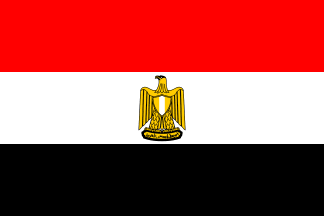
This crackdown hasn’t stopped Sherif Arafa, the cartoonist for the state-run Alittihad newspaper in Egypt, from filing new cartoons about the demonstrations. On a normal day Sherif struggles to voice his criticism without triggering the censors in a country where free speech is too often trampled upon.
Working for a government-run newspaper, Sherif is not allowed to draw about specific politicians, such as President Mubarak, or criticize religion. As a way around that, he created a character called “The Responsible” so he could say what he wanted.
Here are more of his most recent cartoons about the protests in Egypt that threaten to topple the Mubarak Regime
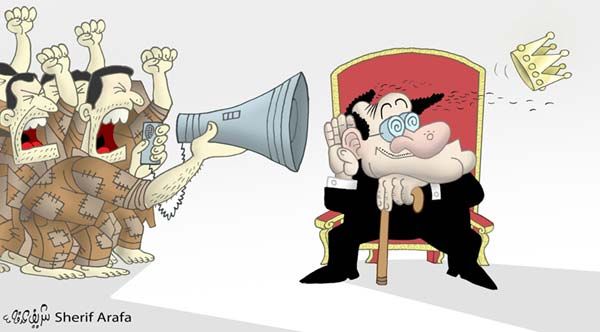
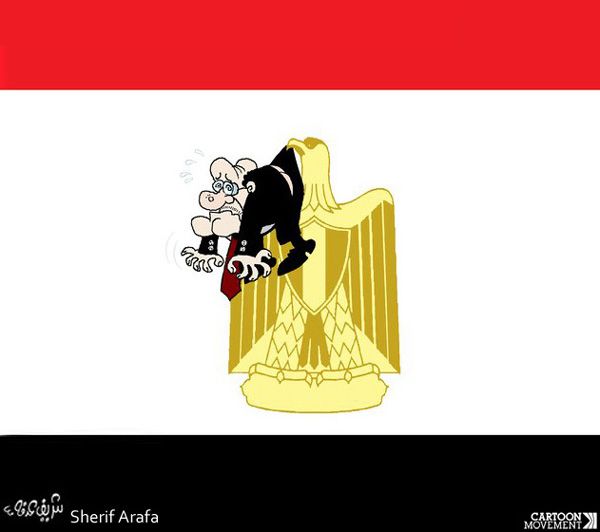
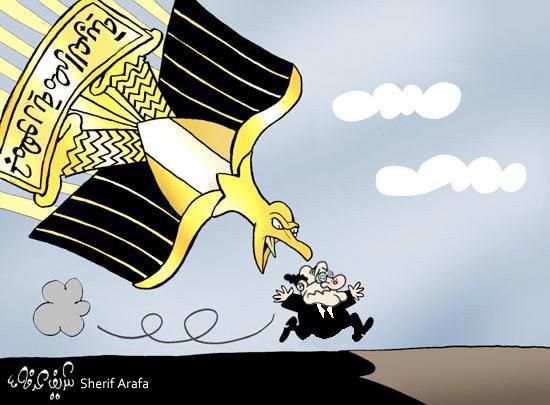
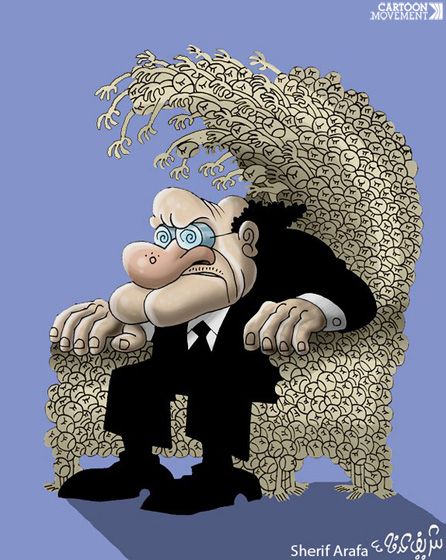
Sherif Arafa, Alittihad (Egypt), Buy these cartoons
Click here to see larger cartoon images
:: ::
Omar Abdallat, Addustour (Jordan), Buy this cartoon:: ::
Jordanian Cartoonist on Egyptian Protests

I just received a bunch of cartoons about the continuing unrest in Egypt by Omar Abdallat, the cartoonist for the Addustour newspaper in Jordan. Much like fellow Jordanian cartoonist Emad Hajjaj, Omar’s cartoons are bold and powerful, and the imagery is both simple and direct.
Jordan is experiencing protests as well, as demonstrators rally against food prices and poor living conditions. King Abdullah has already responded by replacing his prime minister, so as we watch the protests in Egypt and Tunisia grow, we should ask ourselves if Jordan is next?
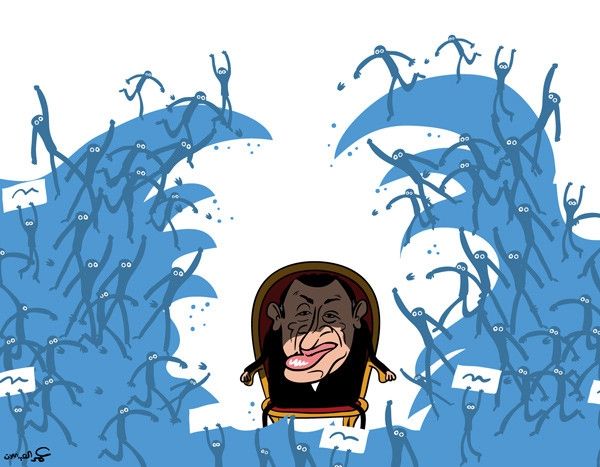
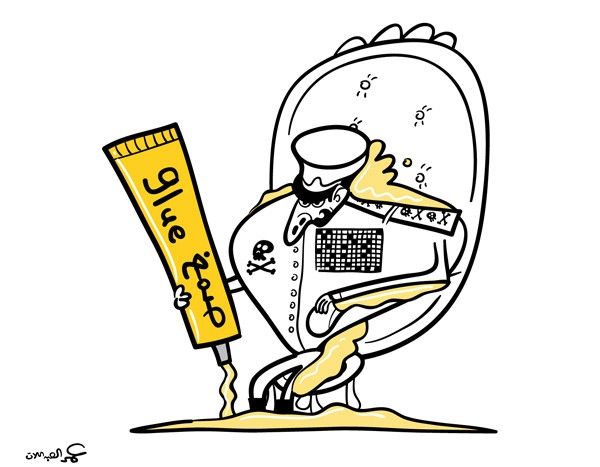
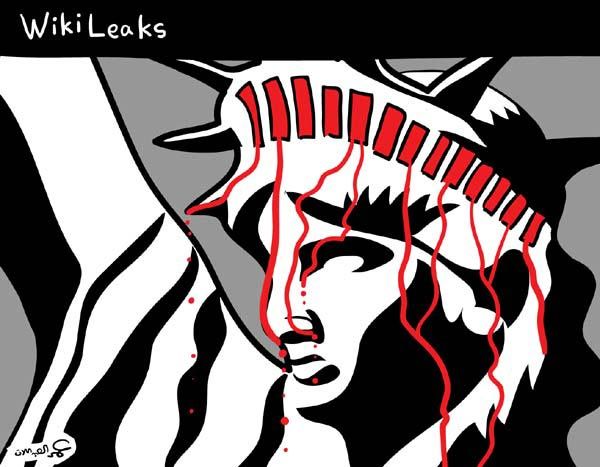
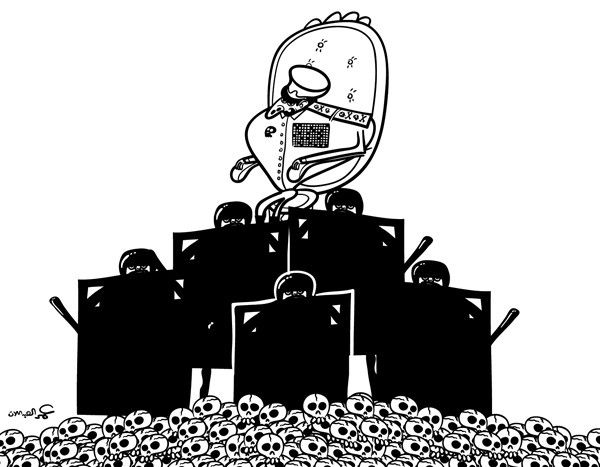
Omar Abdallat, Addustour (Jordan), Buy these cartoons
Click here to see larger cartoon images
:: ::
Emad Hajjaj, Alghad (Jordan), Buy this cartoon:: ::

As the Egyptian protests continue to grow, cartoonists from all over the world are weighing in on this immensely important story. Here are some terrific cartoons about the protests taking place in Egypt by Emad Hajjaj, a Jordanian cartoonist that draws for the Alghad newspaper
:: ::
Emad Hajjaj, Alghad (Jordan), Buy this cartoon
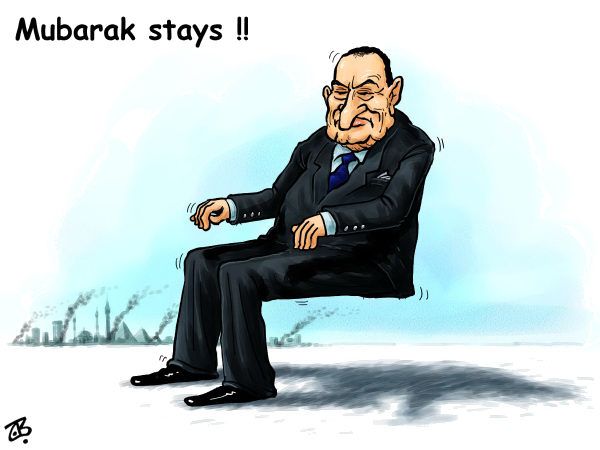
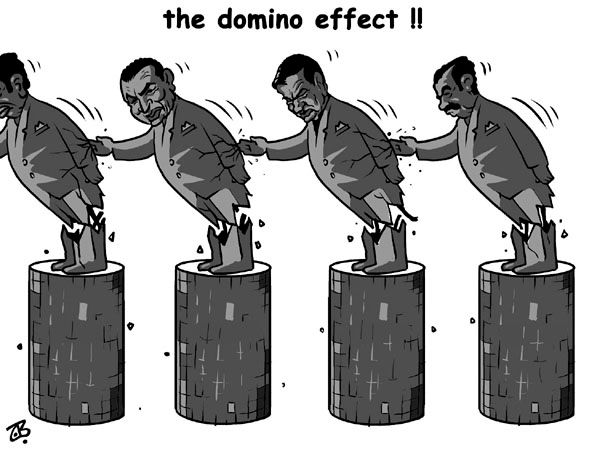
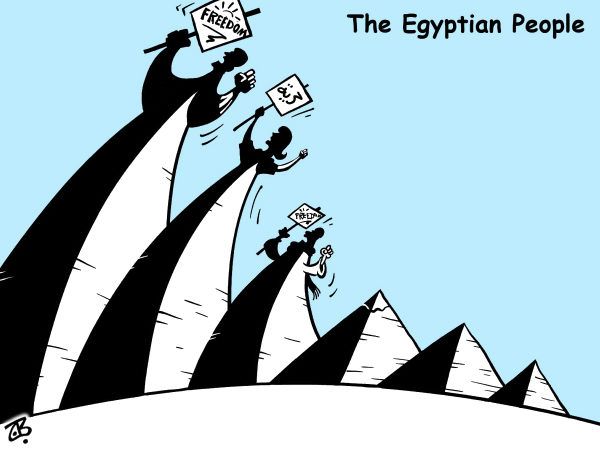
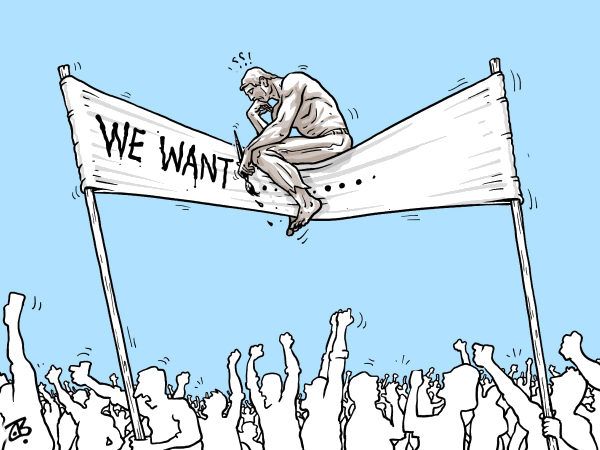
Emad Hajjaj, Alghad (Jordan), Buy these cartoons
:: ::
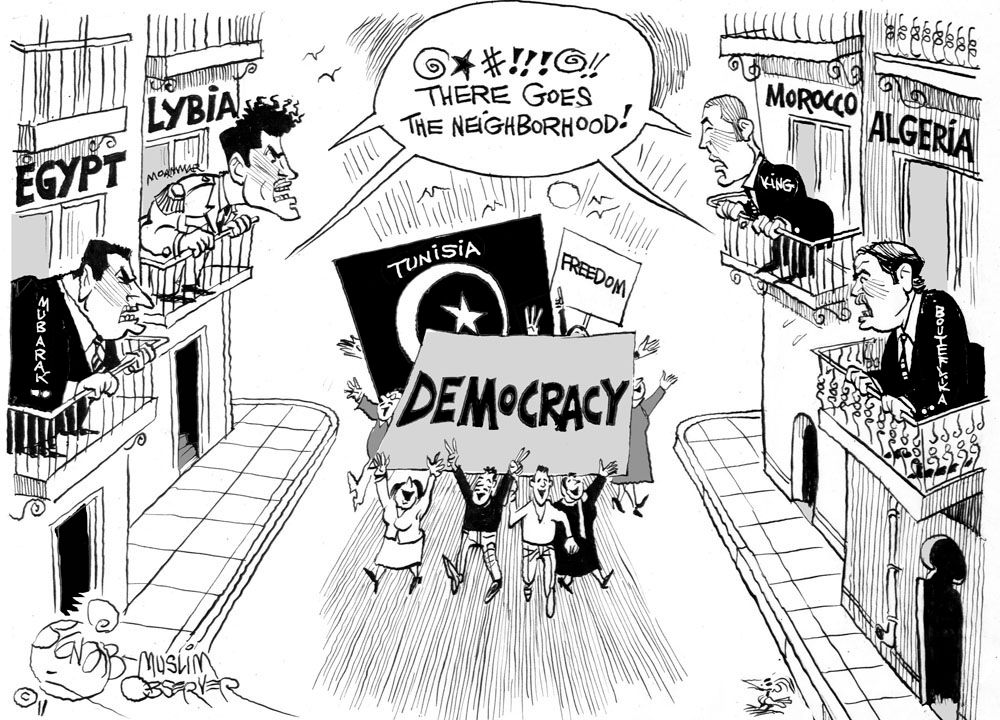
Finally, one of you anonymously sent me a link to these set of cartoons about turmoil in the Middle East.
Whosoever you are, thanks for familiarizing me with this cartoonist. They were published in Jadaliyya by Khalil Bendib. An Algerian-French cartoonist who also spent a few years living in Morocco, he now lives in Berkeley, California. He’s worked for Gannett Newspapers and also co-hosts a weekly one-hour radio program called Voices of the Middle East and North Africa on Pacifica Radio station KPFA (94.1 FM), in Berkeley.
Khalil Bendib, Jadaliyya
Click this link to view larger images of Bendib’s cartoons
:: ::
2. Hosni Mubarak’s Choices: Can He Survive Until September 2011?
|
|
|
|
:: ::
Rogers encourages President Obama to get tougher with Hosni Mubarak
Mubarak is clinging to the old ways. Many of the young people in Egypt have grown up with so much hardship and he is the only leader they have ever known. He needs to step down. Our system in this country isn’t perfect but at least one person or party doesn’t stay in power too long. If they did there would be revolution here too. Obama needs to get a backbone and tell him to get lost.
End Time by Nick Anderson, Comics.com, see reader comments in the Houston Chronicle
Mubarak Out by Paul Zanetti (Australia), Buy this cartoon
Fares Garabet (Syria), Buy this cartoon
Lalo Alcaraz, LA Weekly, Buy this cartoon
Drew Sheneman, Comics.com (Newark Star-Ledger)
Stavro, Al Balad (Beirut, Lebanon), Buy this cartoon
:: ::
3. The Obama Administration’s Position: Does it Have Any Good Options?
|
|
|
|
:: ::
How much can the United States influence the outcome in Egypt, Stein asks?
The Obama administration has been racing to catch up with events in Egypt for more that a week now. Cautiously non-committal at first, we then timidly asked Mubarak not to run again, and when that ploy didn’t work, we asking for a peaceful transition as soon as possible. That request was ignored today with the violent crackdown by Mubarak supporters.
In other words, we’ve done it to ourselves again, supporting an increasingly dictatorial autocrat for thirty years, preferring a predictable despot to the messiness of democratic reform. Mubarak kept the Islamists at bay and maintained the treaty with israel, and that was more than enough to garner our enduring friendship. Given the alternatives in the region, this seemed like a reasonable bargain. What we didn’t do was challenge Mubarak to support democratic values as he drifted toward more and more oppressive rule. If this sounds depressingly familiar, it’s the same pattern we followed in the Americas, when any two-bit dictator could gain our support and our dollars simply by opposing Communism.
It’s no wonder that the people on the street have no love for us despite the billions we’ve poured into Egypt over the decades, and that our influence and our options are now painfully limited.
Egypt by David Fitzsimmons, Arizona Star, Buy this cartoon
The Egypt Bandwagon by John Cole, Scranton Times-Tribune, Buy this cartoon
Mubarak Steps Down by Patrick Corrigan, Toronto Star, Buy this cartoon
:: ::
4. Will Turmoil in Tunisia and Egypt Affect the Greater Middle East?
|
|
|
|
:: ::
Can the turmoil in Egypt spread to other countries in the region? Crowe is aware of the difficult choices confronting the Obama Administration
It’s a powerful thing when a country’s people take to the streets to scream in one voice. Egypt has been simmering for decades. Unemployment, hopelessness, corruption, government oppression, abusive security forces has taken its toll. This past week, the lid came off.
Wikileaks cables show the Obama administration has been actively trying to persuade President Mubarak to lighten up, release dissidents and pursue reforms.
Publicly, the U.S. will be wary of taking sides, but will attempt to work with both the protesters and the government to diffuse the violence in the streets. Words and drawings aren’t enough to capture the complex intensity playing out in Egypt, which is changing with every moment.
Robert Ariail, Comics.com (formerly of The State, SC)
Nervous by Joep Bertrams (The Netherlands), Buy this cartoon
Mike Luckovich, Comics.com (Atlanta Journal-Constitution)
Joel Pett, McLatchy Cartoons/Lexington Herald-Leader
(click link to enlarge cartoon)
Steve Breen, Comics.com (San Diego Union-Tribune)
David Cohen, Asheville Citizen-Times
(click link to enlarge cartoon)
:: ::
5. The Impact of Social Media
|
|
|
|
:: ::
Can any government effectively censor information and prevent its people from speaking out? Given rapid advances in new technologies, it’s becoming more and more difficult to do so, according to Lowe
What’s going on in Egypt could never have happened ten years ago, or even five. Suddenly, with worldwide access to the Internet, people have a tool at their disposal that is so unlike any we have ever known, so “game-changing,” to use a tired but apt cliché, that the political history of mankind from now on now may well be upended…
Now, the masses can organize with an efficiency no one ever envisioned. Even without established leaders, the downtrodden and disaffected of Egypt were able, through “people power,” to forge themselves into a tsunami that has appeared, so far, to seriously threaten (if not topple) the entrenched forces of repression.
Westerners used to think of the Arab world as forever cursed to live under the yoke of despots. Without a history of enlightened democracy in their culture, its people had no models to follow, and lay open to victimization.
Thanks to the developments of the last week in Egypt and Tunisia, we have found that human beings don’t need models to change their condition. All they need, in addition to their anger and frustration, are hope and desire. Social media have given them the means.
Their rulers know it, too, and there are a lot of sleepless nights right now in Middle Eastern palaces of power.
The Ancient Desire for Freedom by Chris Britt, Comics.com, see reader comments in the State Journal-Register (Springfield, IL)
Arab Despots Worry by Patrick Chappatte, Le Temps (Switzerland), Buy this cartoon
Attack by Joep Bertrams (The Netherlands), Buy this cartoon
:: ::
6. Is Authoritarianism Passe and On its Way Out?
|
|
|
|
:: ::
Englehart has some advice for Mubarak
I don’t do many cartoons on foreign affairs. I mean, really, Hosni Mubarak is not going to look at this cartoon and be offended though it would be cool if he did. That would be my fondest wish, that Mubarak would look at this cartoon and say, “OK, that’s it. I’ve had enough. I’m fleeing to London with the rest of my family.”
Mideast Hotfoot by John Cole, Scranton Times-Tribune, Buy this cartoon
Damien Glez, Journal du Jeudi (Ouagadougou, Burkina Faso), Buy this cartoon
The Statue by Olle Johansson (Sweden), Buy this cartoon
:: ::
7. Should One Fear the Emergence of Religious Extremism?
|
|
|
|
:: ::
Thompson would like the President to take a firm stand and side with the protesters in Egypt
For a man who’s earned a reputation as a pretty good speechmaker, President Barack Obama’s been awfully tongue tied when it comes to sticking up for democratic principles in Egypt. To quote a CNN story, “Obama pledged continuing U.S. support for both a longtime ally and the aspirations of protesting Egyptians…”
Huh?
That’s like pledging continuing support for both the Green Bay Packers and the Pittsburgh Steelers in the Super Bowl. Only one team is going to come out on top in Sunday’s big game and only one side is going to prevail in Egypt.
Obama needs to quit straddling the fence and start backing the movement to oust Egyptian dictator Hosni Mubarak.
Egyptian Revolution by Monte Wolverton, Cagle Cartoons, Buy this cartoon
Egypt’s Future by Mike Keefe, Denver Post, Buy this cartoon
Jim Morin, McLatchy Cartoons/Miami Herald
(click link to enlarge cartoon)
Sudan at Crossroads by Paresh Nath, Khaleej Times (UAE), Buy this cartoon
Jasmine Revolution by Pat Bagley, Salt Lake Tribune, Buy this cartoon
:: ::
8. How Should America Project its Values?
|
|
|
|
|
:: ::
Bors is unhappy with our government’s response to this crisis
Our government’s response to the uprising in Egypt is shameful, but not surprising. Even if Obama and Clinton hadn’t come out and coldly hedged their bets against human freedom, they couldn’t have done anything to erase the years of military goodies we’ve lavished on a man who jails dissents and tortures so well we outsourced victims to him to extract confessions. (In fact, his newly appointed VP was in charge of the bloodwork).
While invading two countries in the region during the last ten years, America justified all manner of bloodshed, looting, sectarian violence and mayhem as the “birth pangs” of Democracy. “They could still be living under Saddam!” was the last cry of apologists trying to claim the moral high ground. Then, as millions of people openly rebelled against thirty years of dictatorship, our Secretary of State seemed to suggest a few stores getting looted and a dictatorship continuing were equal concerns.
Pundits who once brushed off the complete demolition of Iraq in order to bring them regularly scheduled elections, now think the chance of radical Muslims filling the power vacuum in Egypt may not be worth letting the brown people govern themselves.
Jeff Stahler, Comics.com (Columbus Dispatch)
Tunisia Then and Now by Paresh Nath, Khaleej Times (UAE), Buy this cartoon
Bruce Beattie, Comics.com (Daytona Beach News-Journal)
Mike Luckovich, Comics.com (Atlanta Journal-Constitution)
Out In Front by Matt Davies, Comics.com, see reader comments in Hearst Connecticut Media Group
:: ::
A Note About the Diary Poll
|
|
|
|
:: ::
What constitutes the “Middle East” is the basis of some debate, interpretation, and even some confusion.
Using the definition used by the United States Department of State, Bureau of Near Eastern Affairs, I’m interested in knowing if you’ve ever traveled to the region. If so, how were your experiences? Would you go back? What did you like or not like about it?
Remember to also take the diary poll.



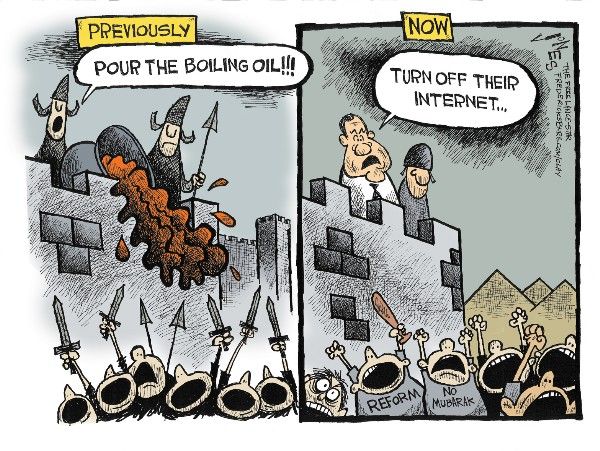
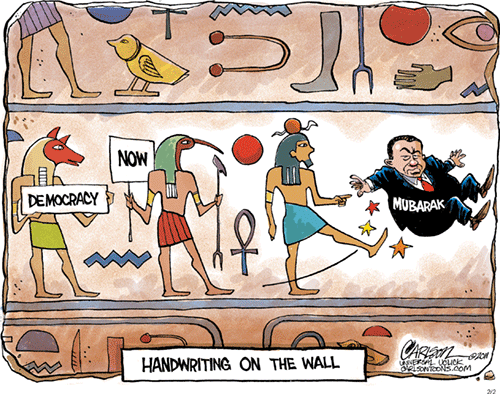
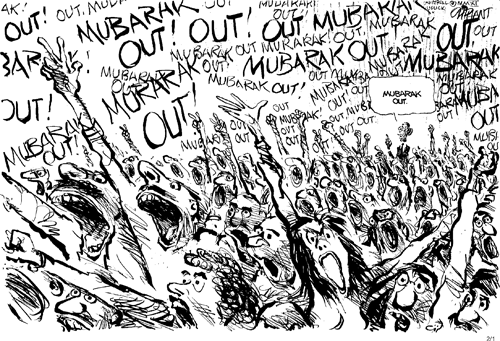
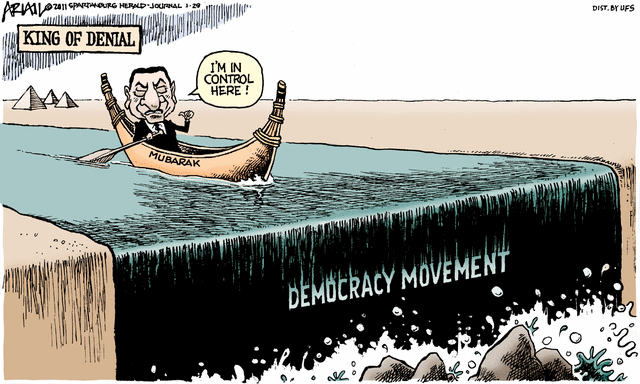
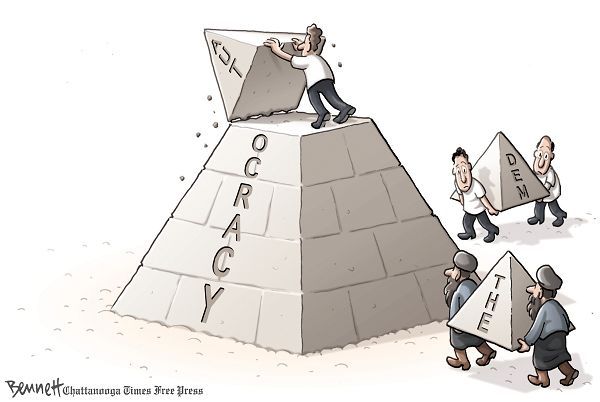
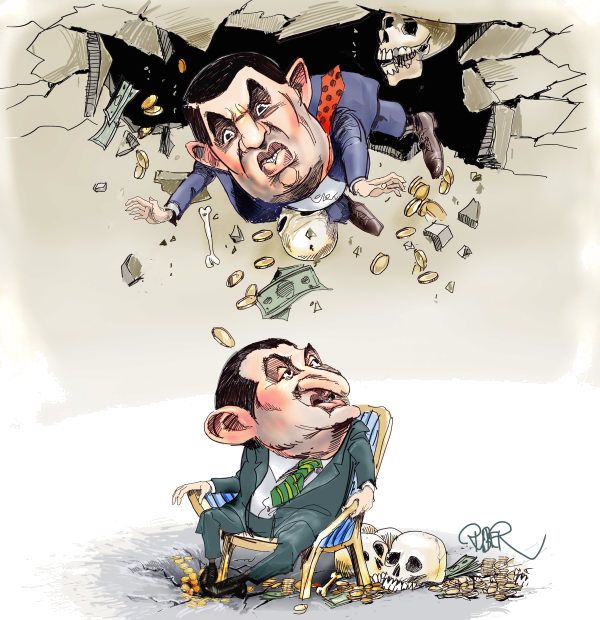
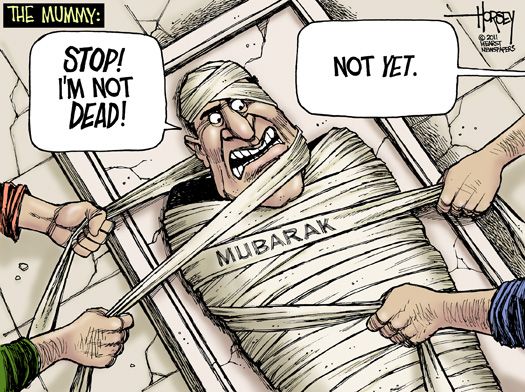
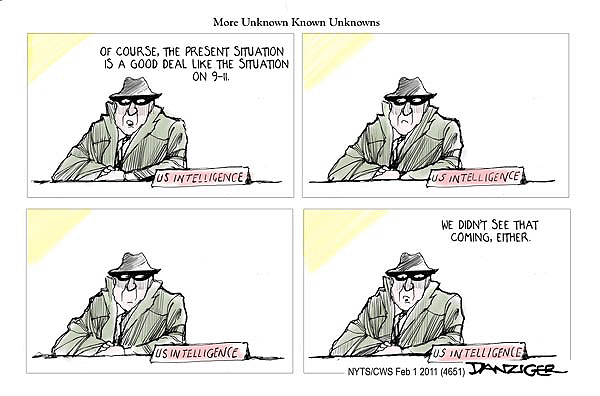

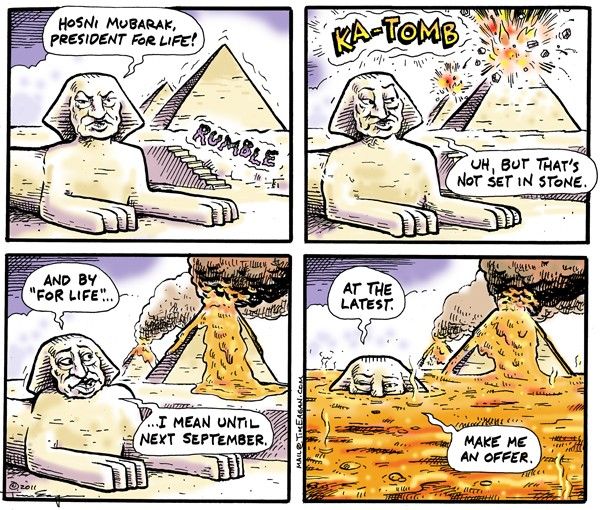
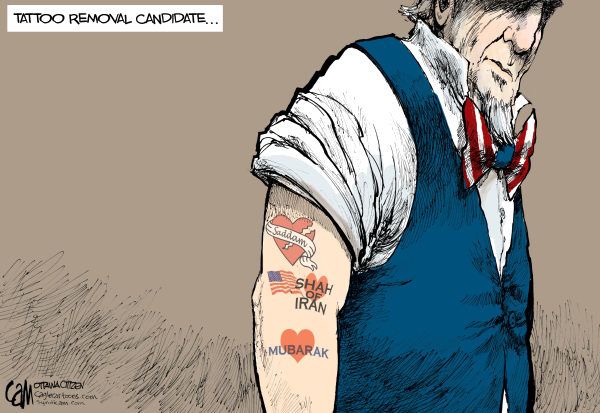
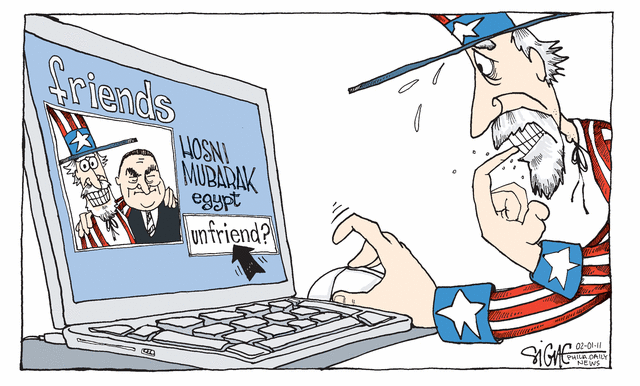
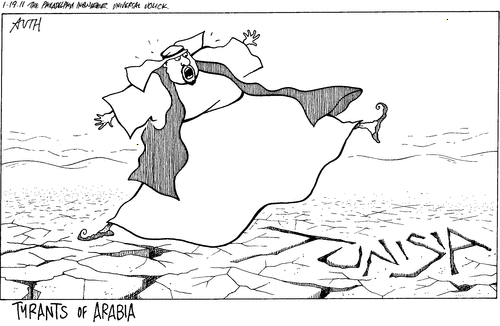
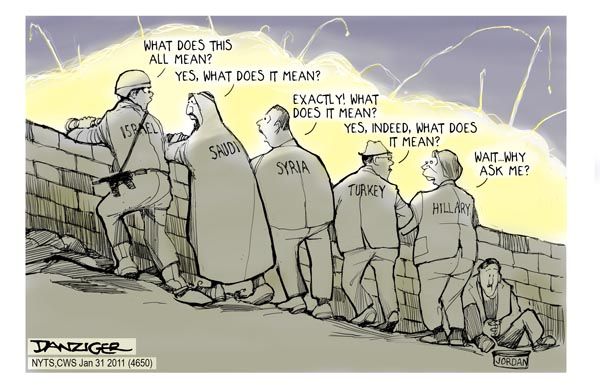
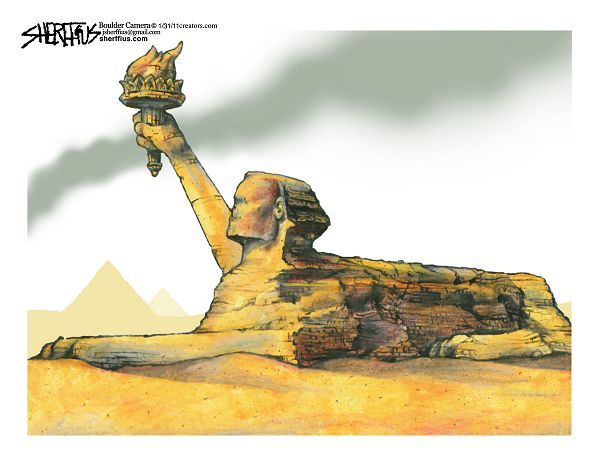
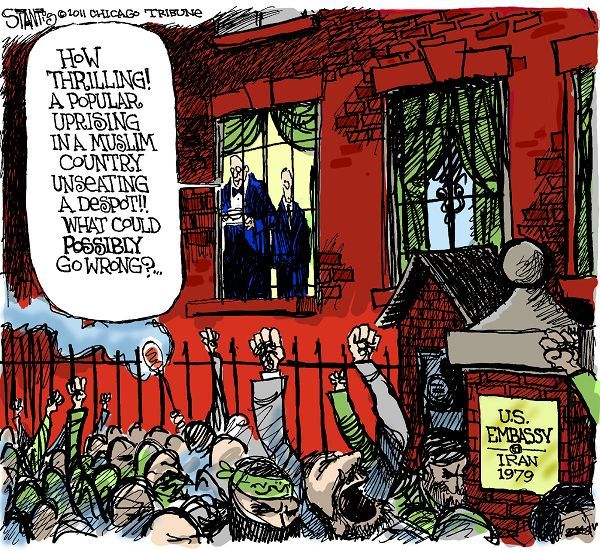
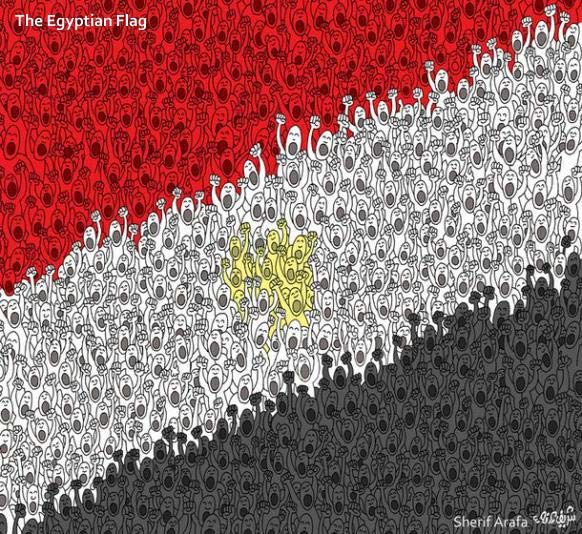
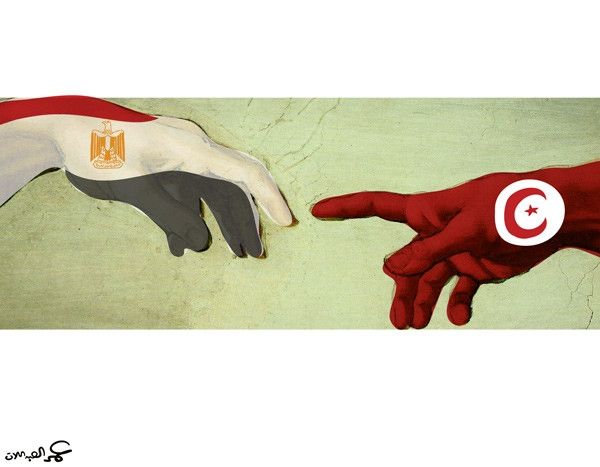
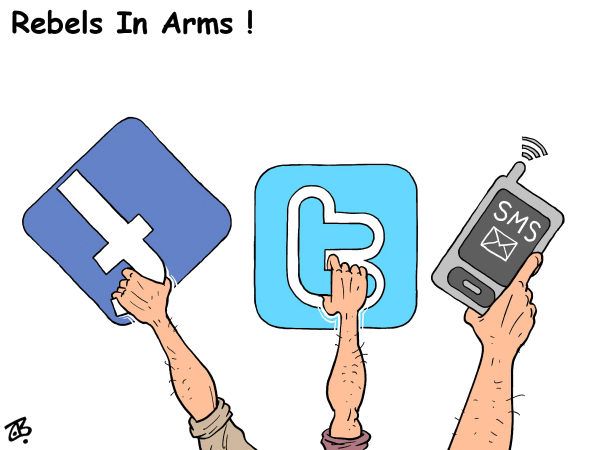

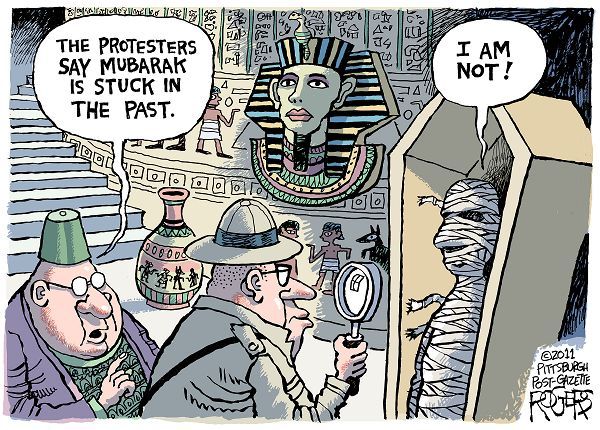
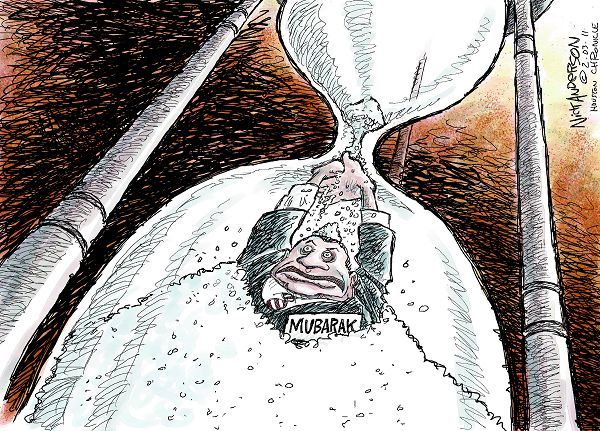
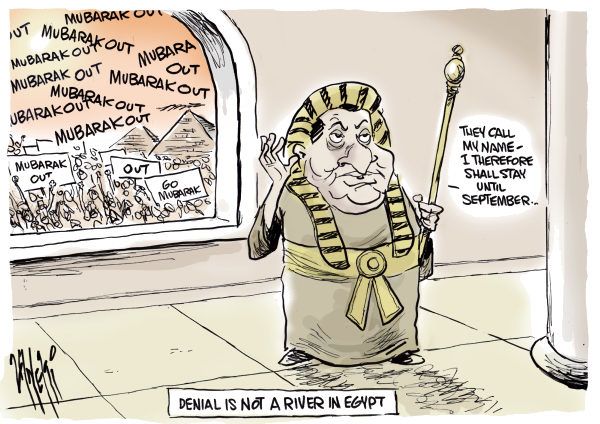
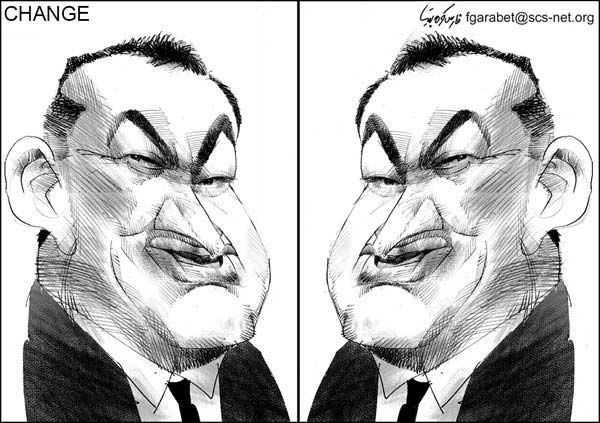
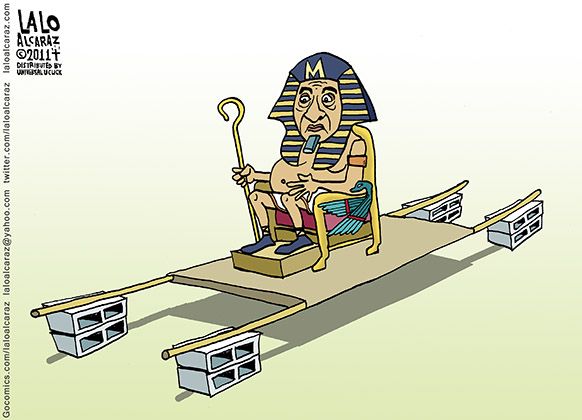
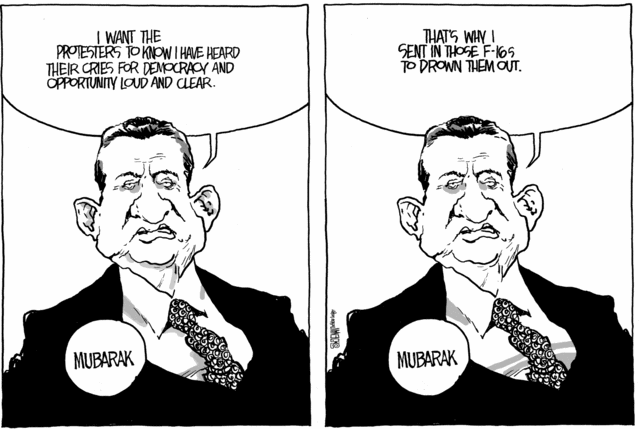
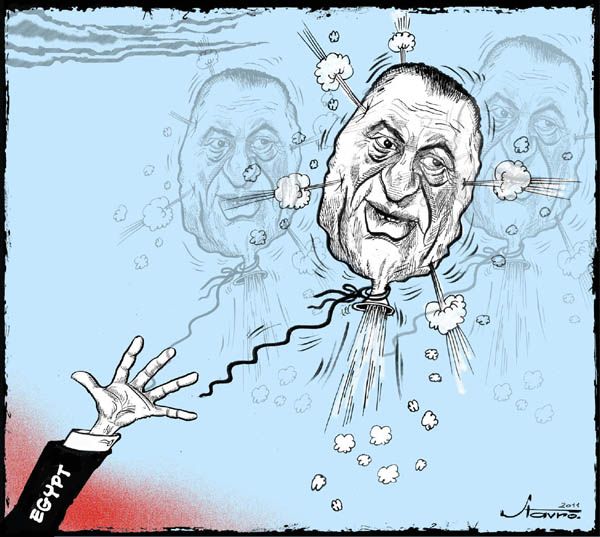
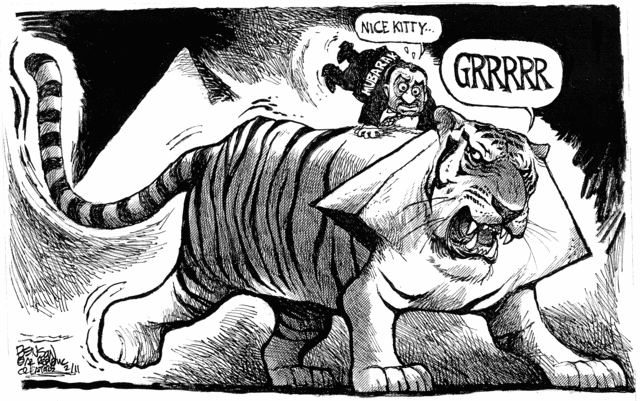
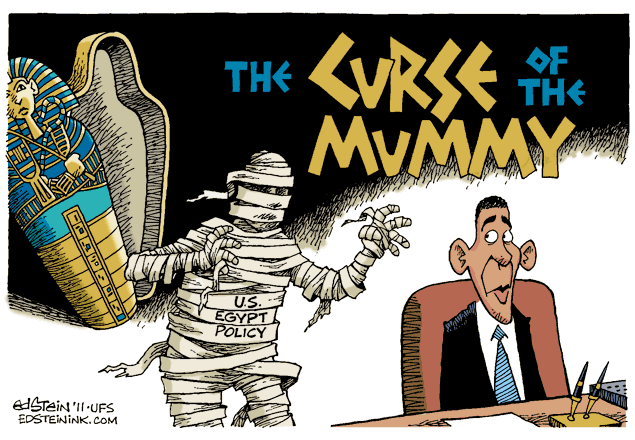
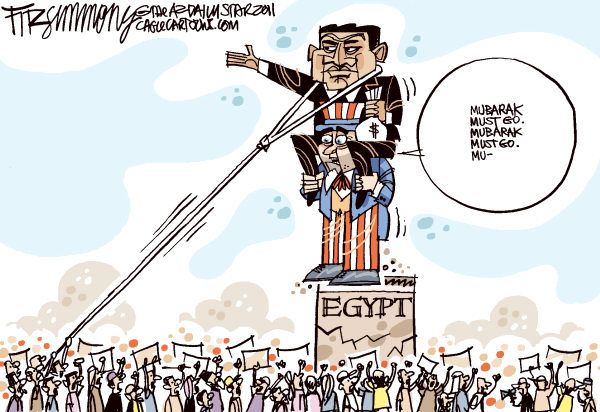
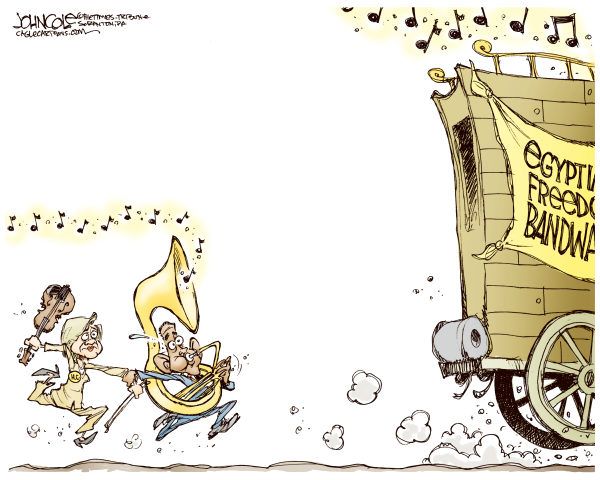
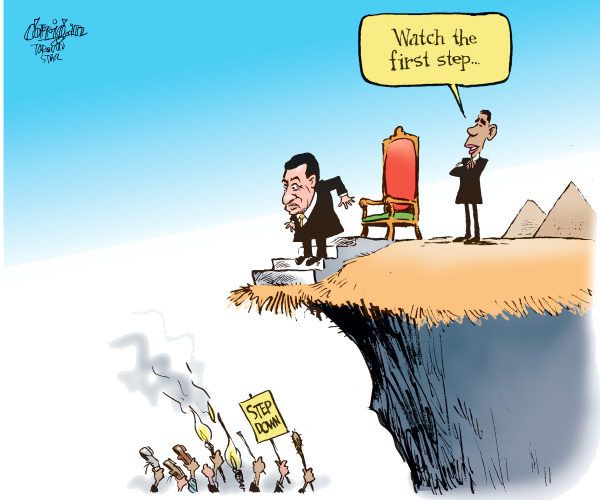
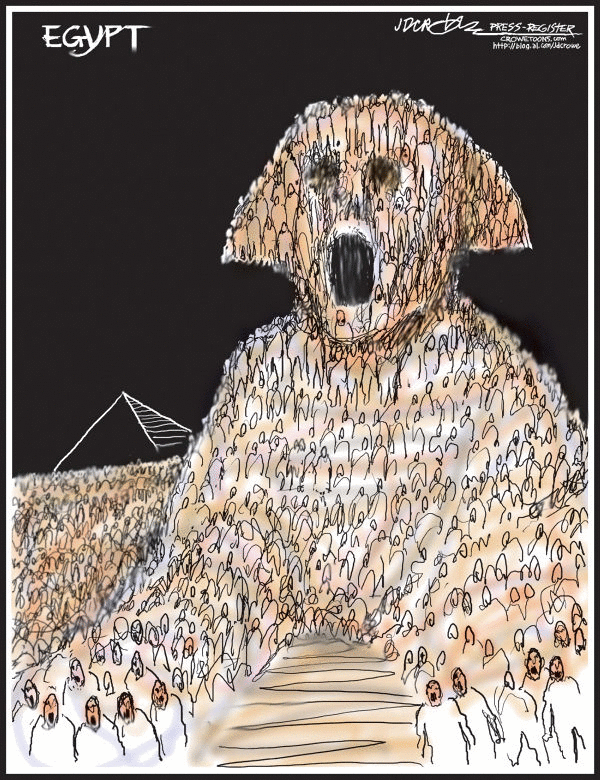
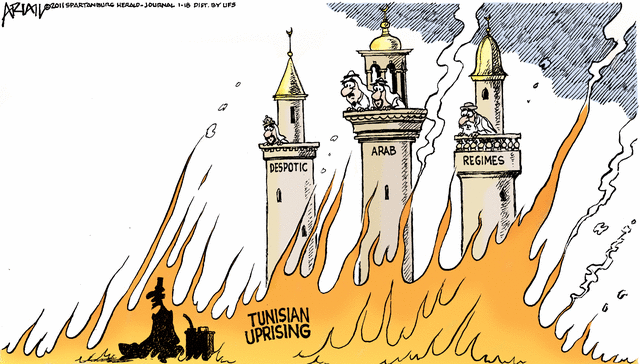
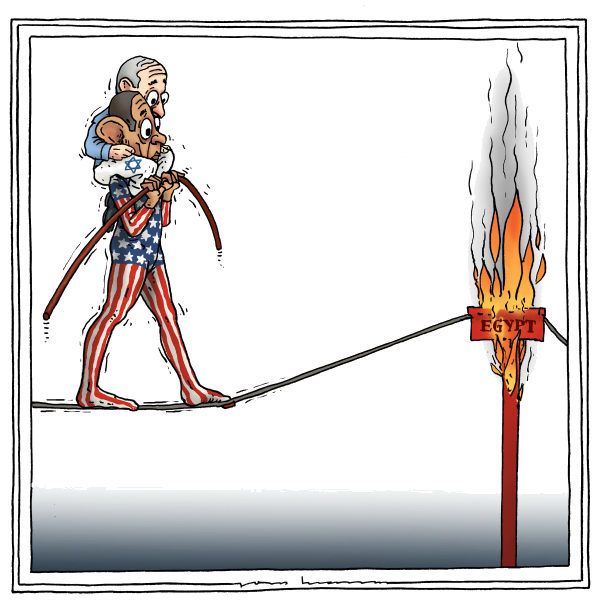
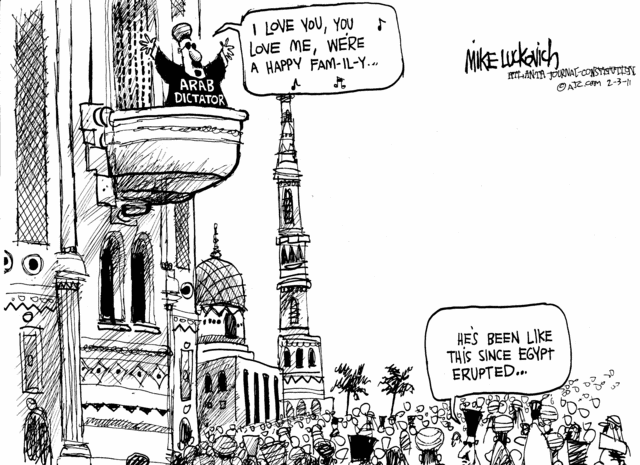
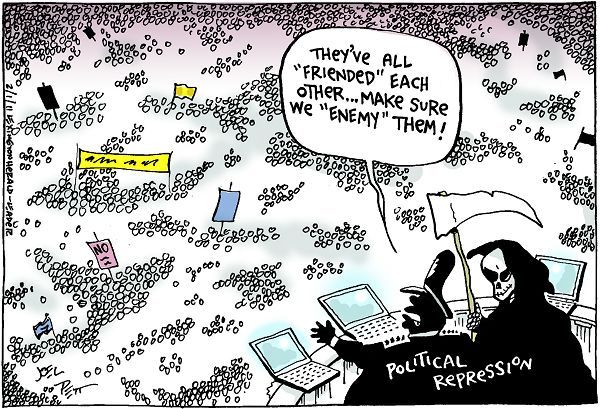
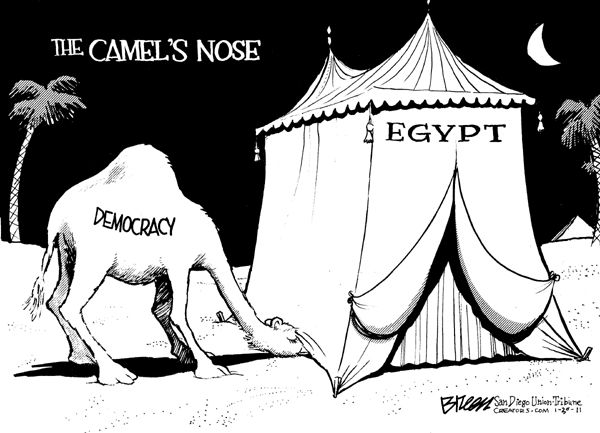
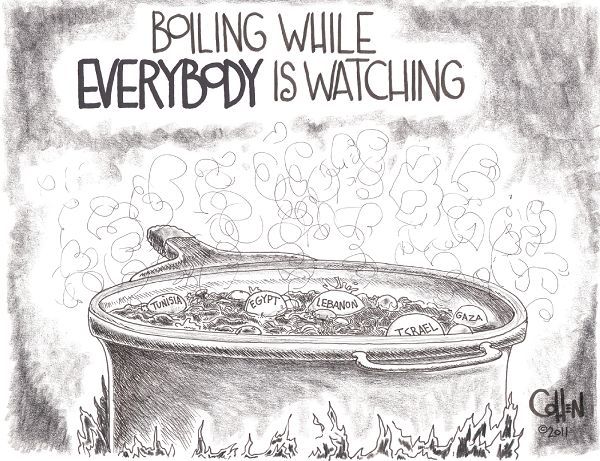
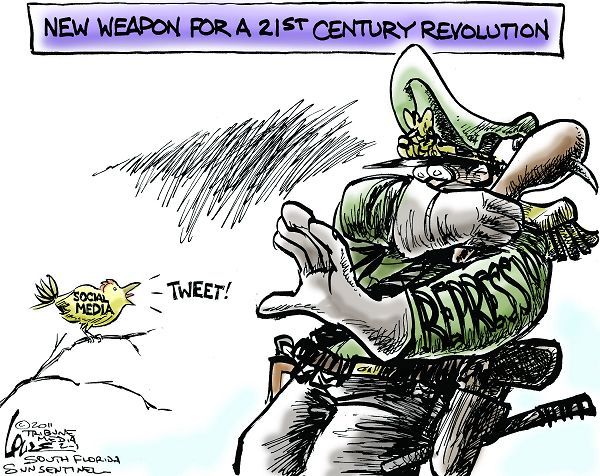
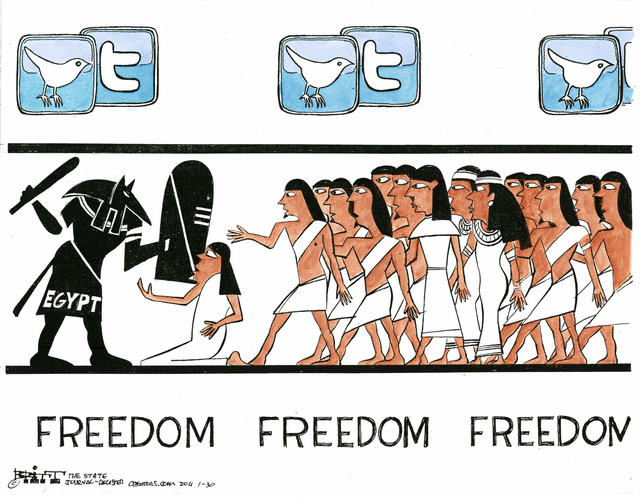
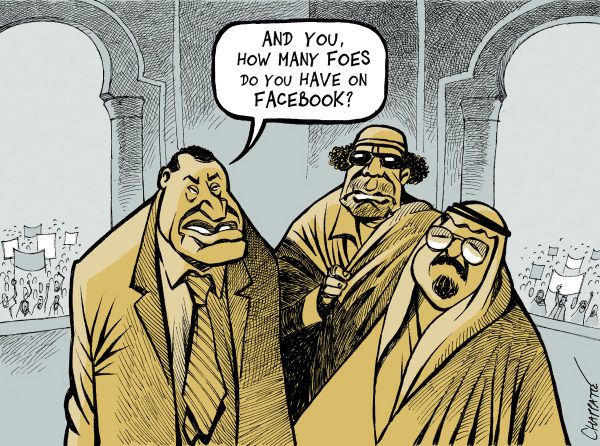

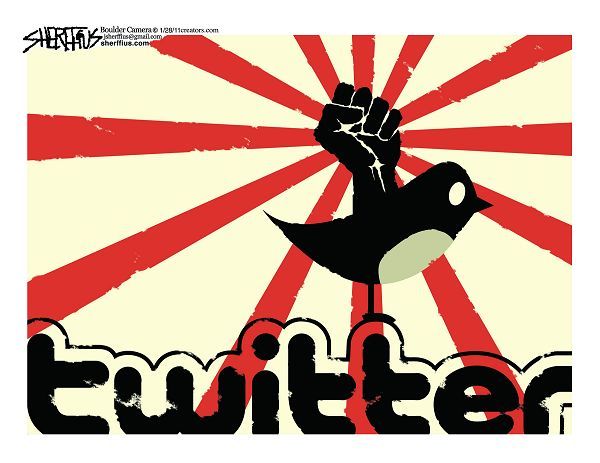
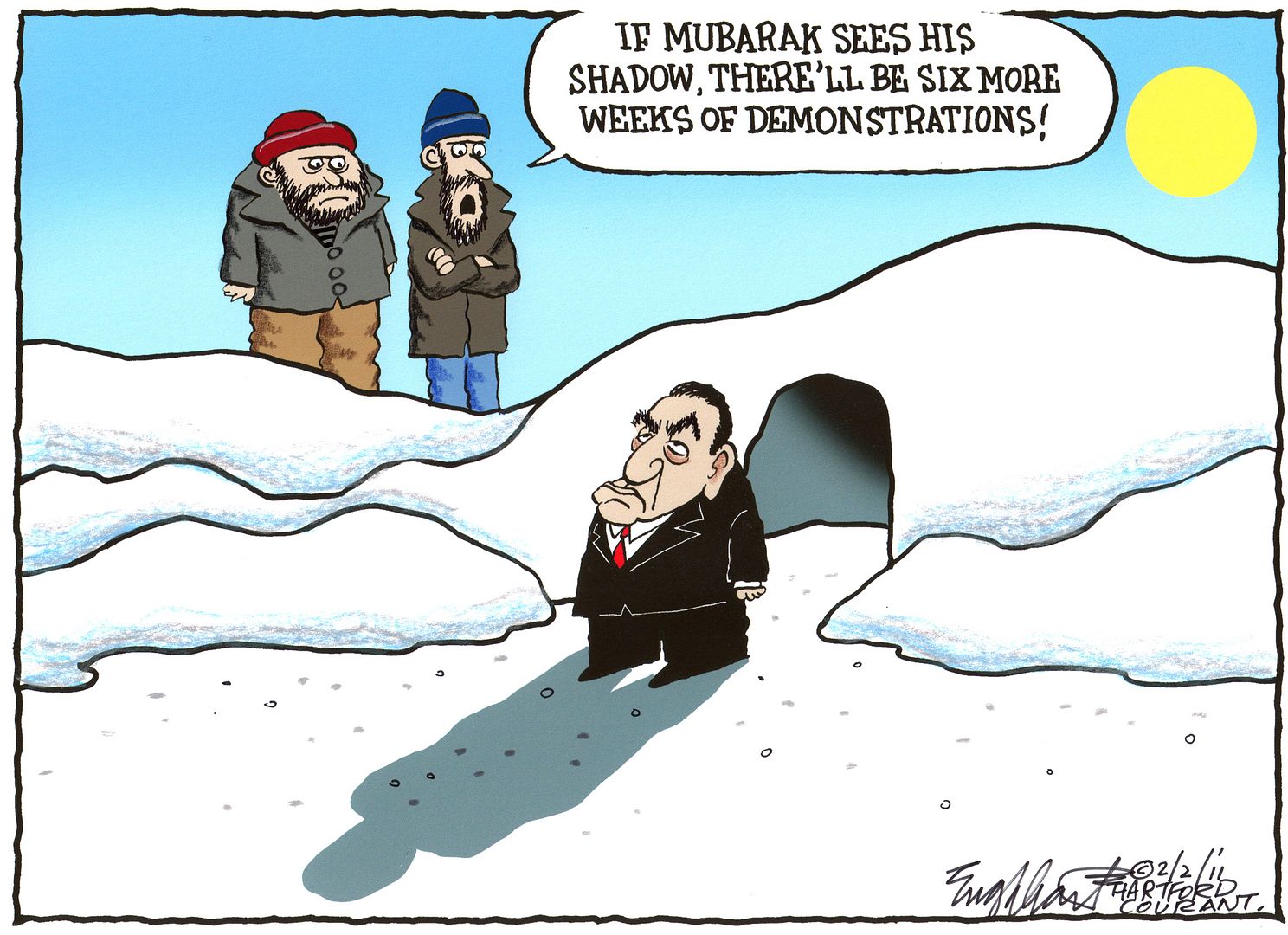
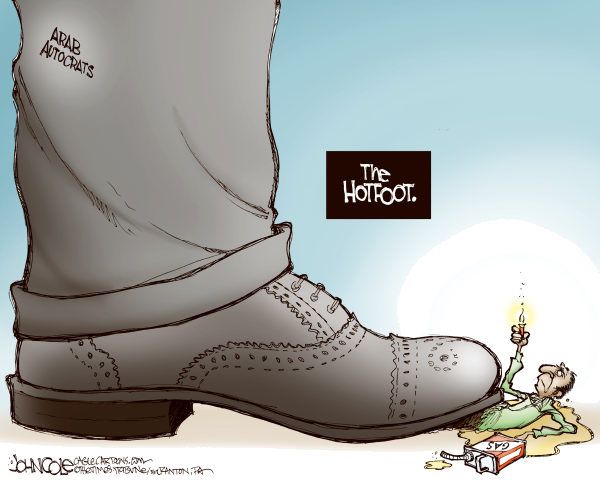
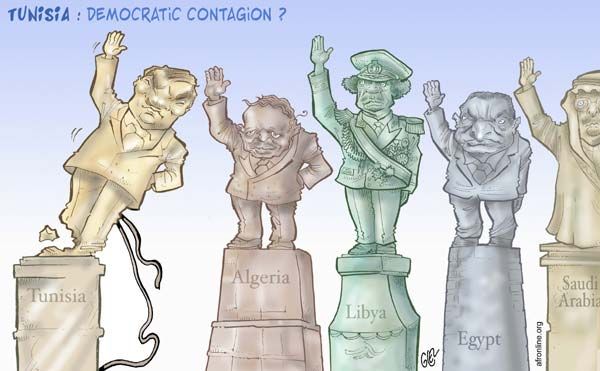
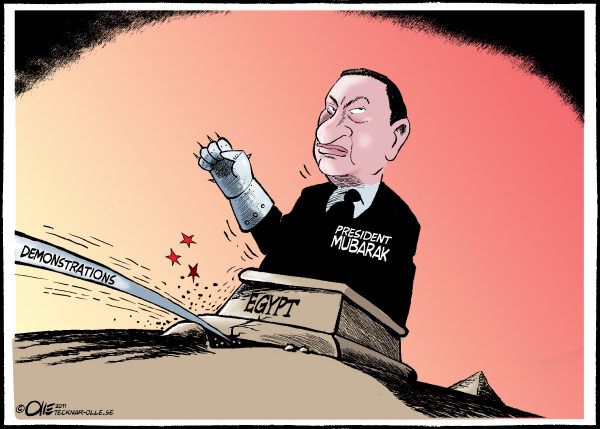
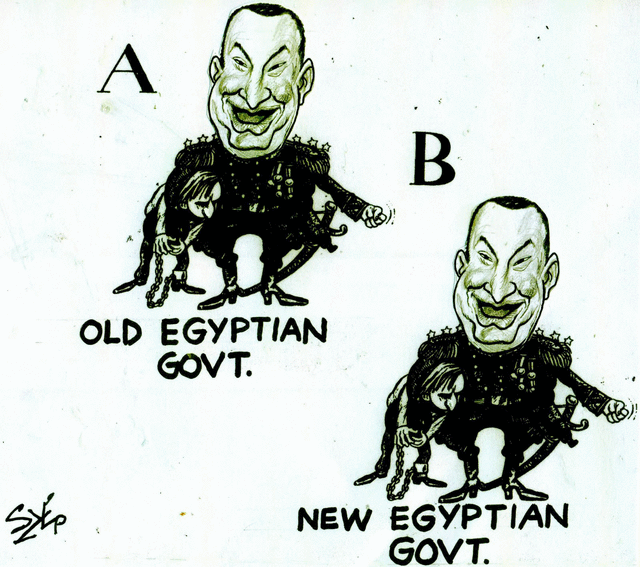
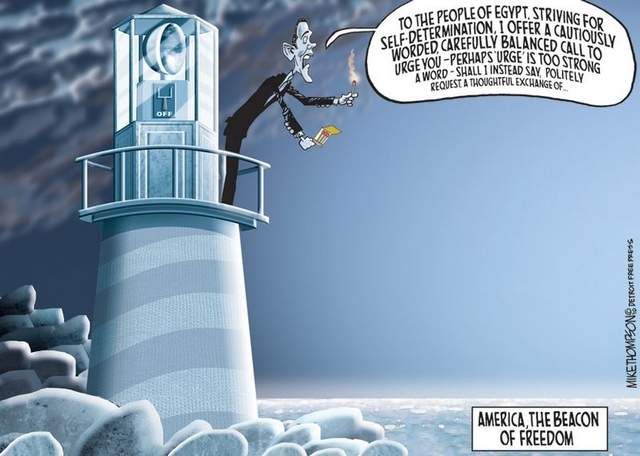
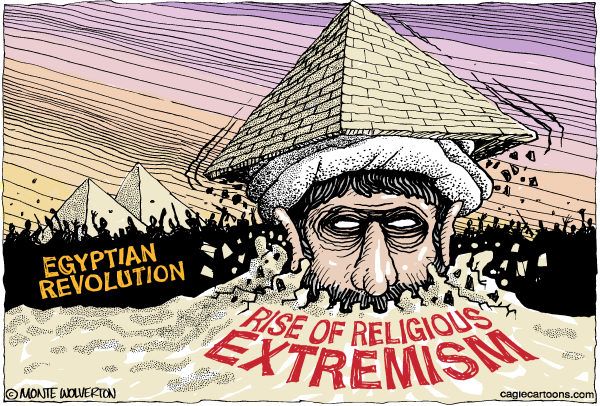
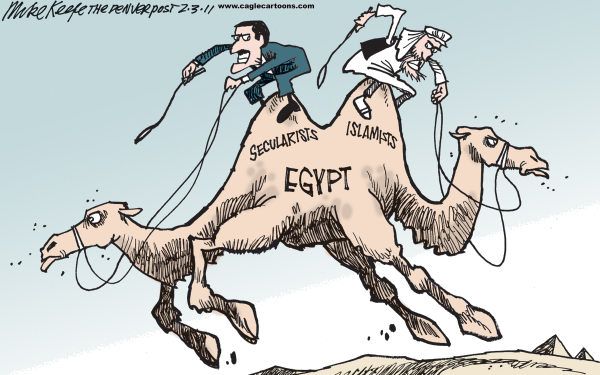
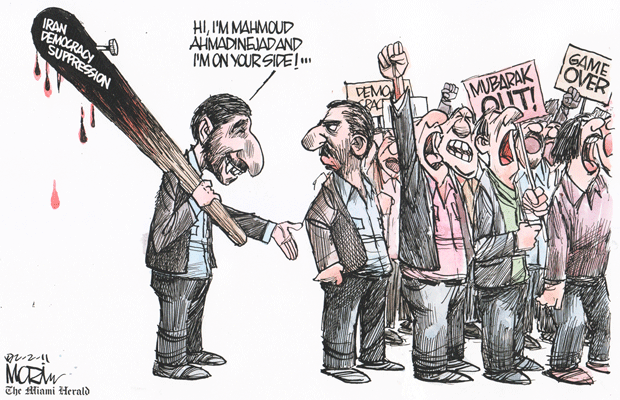
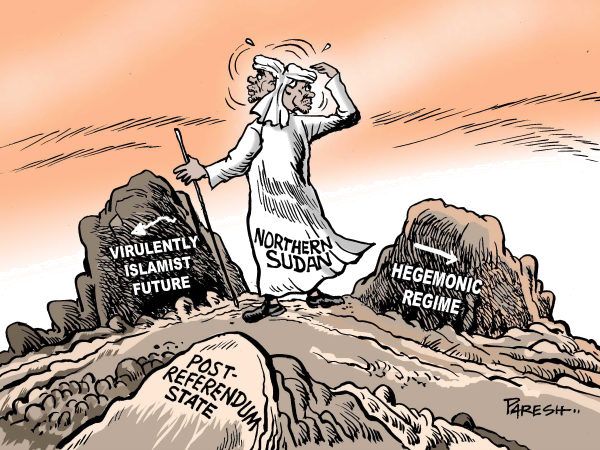
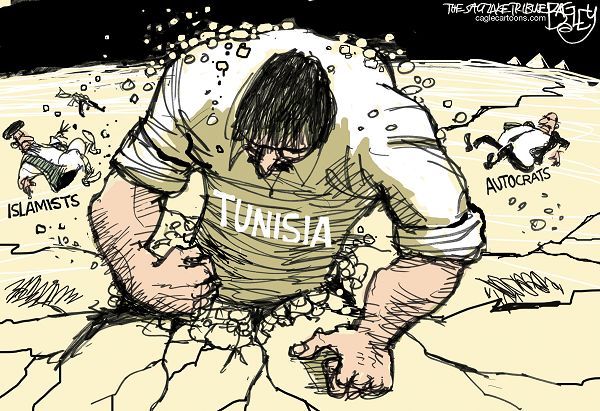

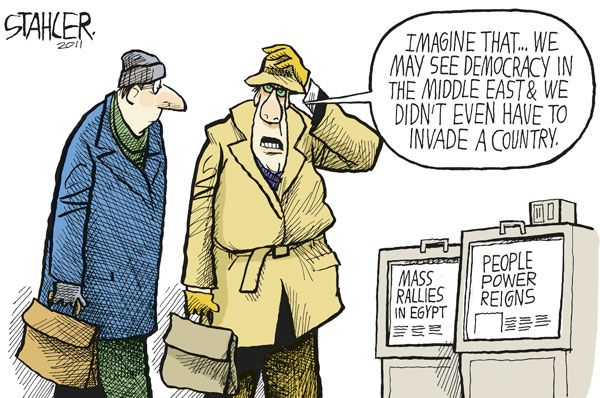
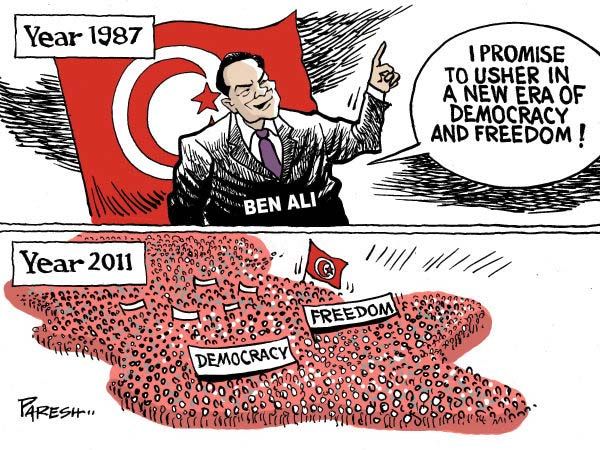
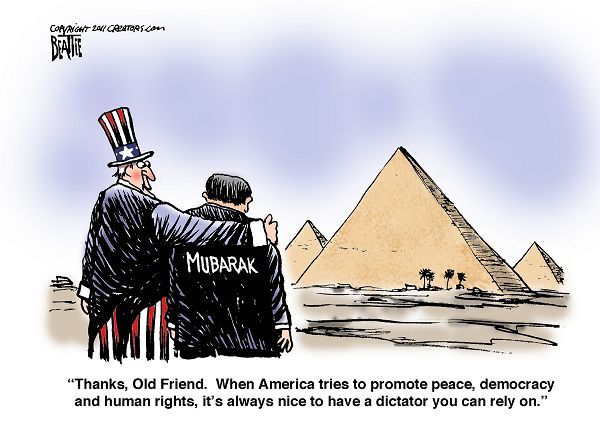
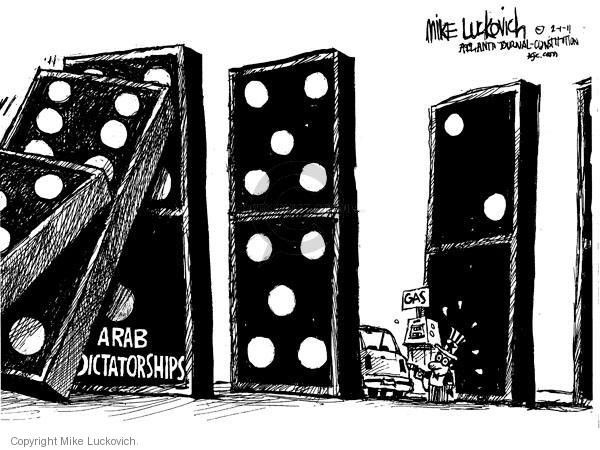
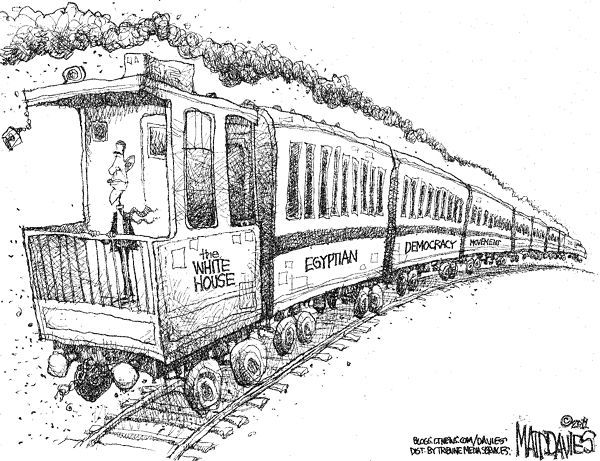

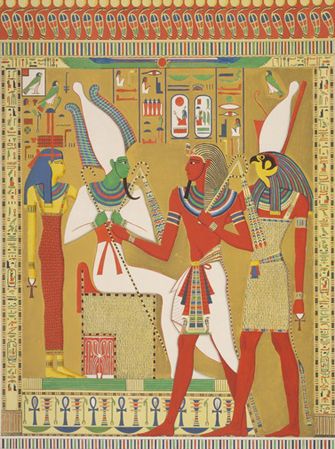
1 comments
Author
… and soon? It remains to be seen if secular and democratic forces can prevail in this fight. Let’s hope that they do so both in the short-term and in the long-run with peace being the end result.
Sparks by Ed Stein, Comics.com, see reader comments on Stein’s blog
As Ed Stein points out on his blog
Tips and the like here. Thanks.